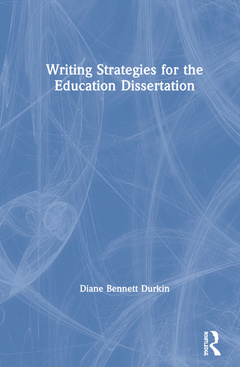Writing Strategies for the Education Dissertation
Auteur : Durkin Diane Bennett

Writing Strategies for the Education Dissertation offers a unique take on doctoral writing. It uses composition and rhetoric strategies to identify key activities for generating thought to keep students writing. It de-mythologizes the view of writing as a mere skill and promotes the view of writing as thinking.
It uses writing to help students invent, think through, write, rethink, and rewrite as they develop and present their innovations. The book opens with this mindset and with the purposes of the task (adding to knowledge); it helps define a "researchable topic," and provides advice on invention ("brainstorming"). It then addresses each of the key sections of the dissertation, from Problem Statement, through Literature Review and Methods, to Findings and Conclusions, while underscoring the iterative nature of this writing. For each chapter, the book provides advice on invention, argument, and arrangement ("organization") ? rhetorical elements that are seldom fully addressed in textbooks. Each chapter also looks at possible missteps, offers examples of student writing and revisions, and suggests alternatives, not rules. The text concludes with an inventive approach of its own, addressing style (clarity, economy, and coherence) as persuasion.
This book is suitable for all doctoral students of education and others looking for tips and advice on the best dissertation writing.
1. De-mythologizing the Process: Changing One’s Mindset 2. The Problem Statement: Writing Processes 3. Writing Strategies for the Literature Review 4. Writing the Methods Chapter, Getting Past Preliminary Orals, and Getting Started 5. Collecting and Analyzing Data, then Writing up Results and Findings 6. Writing up the Discussion: Conclusions and Recommendations 7. Revising the Dissertation as a Whole
Diane Bennett Durkin has taught critical thinking and writing at UCLA for over 30 years, publishing textbooks that merge disciplines, and helping education doctoral students understand and use writing processes to generate, organize, and communicate their ideas.
Date de parution : 12-2020
15.6x23.4 cm
Disponible chez l'éditeur (délai d'approvisionnement : 14 jours).
Prix indicatif 160,25 €
Ajouter au panierDate de parution : 12-2020
15.6x23.4 cm
Thèmes de Writing Strategies for the Education Dissertation :
Mots-clés :
Literature Review; dissertation writing; Doctoral Students; dissertation; Discussion Chapter; dissertation in education; IRB Approval; education research methods; Transfer Students; education research; Community College Transfer Students; writing strategies; Student Engagement; academic writing strategies; LAUSD; academic writing; Charter Schools; doctoral studies; Enrollment Management; doctoral dissertation; SBS; EdD dissertation; Successful Dual Language; EdD degree; Dl Student; research methods; Dl Program; writing up research; Findings Chapter; Education dissertation; IRB; Doctoral writing; Main Verb; Rhetoric strategies; Sequential Mixed Methods Research Design; Noun Style; Adaptive Leadership; Upfront Strategies; Par Team; Dual Language Program; Public Engagement; Student’s Intent



